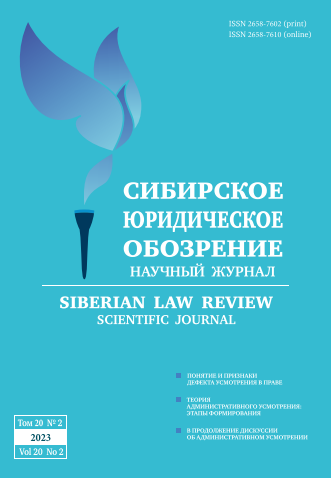Continuing the Discussion on Administrative Discretion
- Autores: Starostin S.A.1
-
Afiliações:
- Kutafin Moscow State Law University
- Edição: Volume 20, Nº 2 (2023)
- Páginas: 145-157
- Seção: PUBLIC LEGAL (STATE LEGAL) SCIENCES
- ##submission.datePublished##: 07.07.2023
- URL: https://journal-vniispk.ru/2658-7602/article/view/349079
- DOI: https://doi.org/10.19073/2658-7602-2023-20-2-145-157
- EDN: https://elibrary.ru/TQIGZQ
- ID: 349079
Citar
Texto integral
Resumo
The article continues the discussion on the topical issue of administrative discretion for Russian administrative-legal theory and legal practice, organized by the editors of the journal “Siberian Law Review” on the pages of two previous issues of the journal with the participation of P. P. Serkov and Yu. P. Solovey. The Author focuses on the state of the modern domestic doctrine of administrative discretion, the contribution of Russian legal scholars to its development, the need and possibility (including criteria and limits) of delimiting administrative discretion from other types of discretion. It is proved that the Russian jurisprudence demonstrates, contrary to the assertions of some experts, not confusion in the face of the problematic category of discretion, but ontological and methodological certainty, although sometimes reaching extremes. At the same time, there is no single Russian doctrine of discretion, there are many such doctrines, and some scholars have the right to claim that specific doctrines are associated with their names. The Author draws attention to the fact that discretion in general and administrative discretion in particular are interdisciplinary (interscientific) categories, so they must first of all be rid of the semantic and meaningful “layers” of other sciences. The sooner a pure theory of discretion appears, the more mistakes and risks will be insured against by legal science and law enforcement practice. In order to avoid terminological confusion and preserve the subject matter of the study, it is absolutely important to distinguishfour concepts: 1) administrative discretion; 2) judicial control over administrative discretion; 3) judicial discretion; 4) judicial discretion in the exercise of judicial control over administrative discretion. These concepts have a certain connection with each other, however, they designate different (partly even by their branch affiliation) categories, phenomena, processes and institutions. As a conclusion, it is indicated that the motives of each discretionary decision of the public administration must sooner or later (better sooner than later) be made public. To make this a reality, legal science needs to develop and offer effective legal guarantees for ensuring the rights of citizens and their associations when public authorities exercise their discretionary powers.
Sobre autores
Sergei Starostin
Kutafin Moscow State Law University
Autor responsável pela correspondência
Email: prof.starostin@gmail.com
ORCID ID: 0000-0002-0108-7916
Código SPIN: 4309-0096
Professor of the Department of Administrative Law and Process, Doctor of Legal Sciences, Professor
Rússia, 9 Sadovaya-Kudrinskaya st., Moscow, 125993Bibliografia
- Davydov K. V. Discretion and Some Errors of the Legislator. Journal of the Administrative Proceedings. 2017;2:57-65. (In Russ.).
- Shevtsov S. G. Discretion, Arbitrariness, Persuasion: Linguistic, Doctrinal and Legislative Approaches. Eurasian Law Journal. 2011;11:48-52. (In Russ.).
- Cheremisina A. S. The Principle of Feasibility in the Activity of Agencies of Executive Power. Administrative Law and Procedure. 2013;3:66-67. (In Russ.).
- Kelsen H. Pure Theory of Law (2nd ed., 1960). St. Petersburg: Alef-Press; 2015. 542 p. (In Russ.).
- Volokh S. A. Psychology of Professional Discretion in Law Enforcement Activities of the Ministry of Internal Affairs. Bulletin of St. Petersburg University of the Ministry of Internal Affairs of Russia. 2018;1:197-200. (In Russ.).
- Zaitsev D. I. Administrative Discretion in Foreign Science: Political and Legal Aspects. In: The Role of Law in Ensuring Human Well-Being. Part 5. Moscow: Kutafin Moscow State Law University Publ. Centre; 2022. P. 223- 226. (In Russ.).
- Sharnina L. A. Administrative Discretion in the Economic Sphere: Grounds and Limits. Proceedings of the Institute of State and Law of the RAS. 2018;13(5):151-173. (In Russ.).
- Solovey Yu. P. Administrative Discretion (Comparative Legal Research). In: Khachaturov R. L., Shergin A. P. (Eds.). Formation and Development of Branches of Law in the Historical and Modern Legal Reality of Russia. Vol. VIII. Administrative Law in the System of Modern Russian Law. Moscow: Yurlitinform Publ.; 2022. P. 407-454. (In Russ.).
- Gorbunova O. N. Selected Works. Moscow: Russian State University of Justice Publ.; 2017. 543 p. (In Russ.).
- Denisenko V. V. Administrative and Judicial Discretion in Affairs Production About Administrative Offenses: General and Special. Society and Law. 2013;1:229-234. (In Russ.).
- Markov P. V. Administrative and Judicial Discretion. Proceedings of the Institute of State and Law of the RAS. 2011;5:85-95. (In Russ.).
- Shchepalov S. V., Zaitsev D. I. Administrative and Judicial Discretion in Russian Science: Problems of Correlation. Tomsk State University Journal of Law. 2022;46:107-118. https://doi.org/10.17223/22253513/46/8 (In Russ.).
- Sherstoboev O. N. Administartive Law and Principle of Reasonableness (Part 1: Foredgein Experience). Proceedings of Voronezh State University. Series: Pravo. 2017;4:151-161. (In Russ.).
- Zaitsev D. I. Administrative Discretion in Foreign Science: Theoretical and Legal Aspects. In: Kaplunov A. I. (Ed.). Actual Problems of Administrative and Administrative Procedural Law (Sorokin Readings). St. Petersburg: Saint Petersburg University of the Ministry of the Interior of Russia Publ.; 2022. P. 200-203. (In Russ.).
- Starilov Yu. N. About Two Main Ways of Modern Development of Russian Administrative and Administrative Procedural Legislation (Thesis). Proceedings of Voronezh State University. Series: Pravo. 2014;3:6-10. (In Russ.).
- Starilov Yu. N. Establishment of Administrative Legal Proceedings in the Code of the Russian Federation on Administrative Offenses as a Special Form of Implementation of the Constitutional Legal Norm and as the Main Result of the Modernization of Administrative Procedural Legislation. In: Solovey Yu. P. (Ed.). Actual Problems of Administrative Legal Proceedings. Omsk: Omsk Law Academy Publ.; 2015. P. 224-249. (In Russ.).
- Korkunov N. M. History of Philosophy of Law. St. Petersburg: A. S. Suvorin Publ. House; 1908. VI, 431 p. (In Russ.).
Arquivos suplementares












